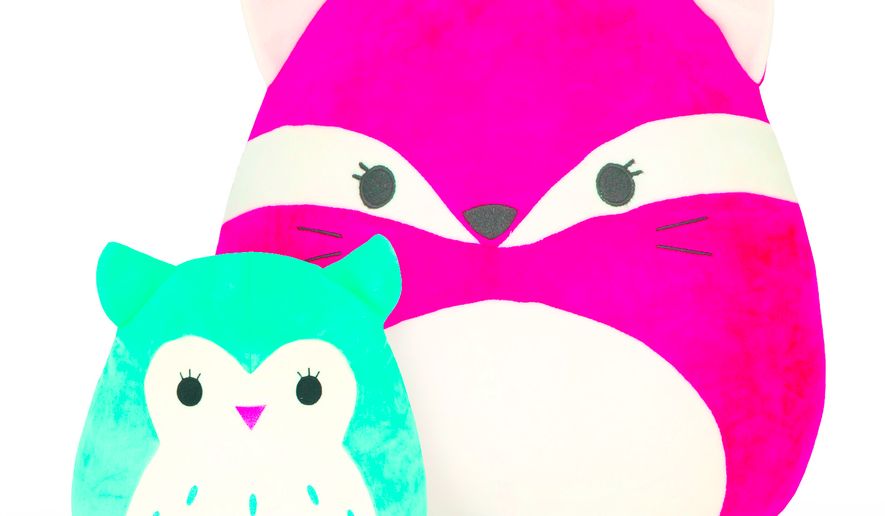This season’s hottest toy doesn’t have a touch screen, doesn’t link to Wi-Fi and doesn’t use artificial intelligence. It doesn’t even light up.
Squishmallows, a series of plush toys 2 to 24 inches long, recently won the Toy Association’s Toy of the Year and People’s Choice awards. Industry analysts say they are the favorite this holiday season as pandemic-weary Americans seek to wean their children off screens and stretch their budgets to offset inflation.
“Adults like to share the joy of the toys they had growing up with the kids in their lives,” Hamilton Noel, a data scientist at consumer researcher Pattern, told The Washington Times. “And there’s something about an old-school toy without the bells and whistles of new tech that feels dependable and safe.”
Consumer demand for low-tech toys less than $50 is also ticking up for throwbacks such as Barbies and Hot Wheels, market researchers say.
Searches on Amazon.com for “hot wheels” shot up 843% over the 30 days ending Thursday as an estimated 58% of consumers looked for discounts to offset high inflation, according to Jungle Scout, a company that provides software and product research to Amazon sellers.
“Toy companies often resurrect classic toy lines, which boosts popularity around the holidays,” said Mike Scheschuk, president of small and medium business for Jungle Scout, based in Austin, Texas.
SEE ALSO: California task force suggests paying $223,000 in reparations to Black residents
“We’ve seen this recently with brands like Tamagotchi and Hot Wheels, which transcend generations and make parents feel nostalgic,” Mr. Scheschuk said. “These iconic toys saw an uptick in sales as consumers took advantage of the best deals from Black Friday and Cyber Monday.”
Parents have reason to be thrifty this year. Inflation and scarcity have jacked up toy prices by 10% to 15% since the COVID-19 pandemic started, said Jay Foreman, CEO of Basic Fun, a toy company based in Boca Raton, Florida.
Rising demand and global supply chain problems have affected the costs of manufacturing, labor, raw materials and components across the industry, Mr. Foreman said in an email.
“When money is tight, consumers — especially gift-givers like grandparents, aunts, uncles and family friends — are going to opt for toys they know and trust, as opposed to the hot new thing,” he said. “So they will buy a Tonka Truck or Lite-Brite and let mom and dad buy Magic Mixies. Classics are always in.”
Basic Fun’s hottest toys include the Care Bears 40th Anniversary Bear, Lite-Brite Wall Pop Art and Tonka Trucks — all affordable throwbacks to the past century.
Even Lincoln Logs, invented in 1916 by the son of architect Frank Lloyd Wright, is trending this month.
Many parents with less to spend this year because of rising living costs are looking for “multifunctional toys” that teach children and engage motor skills, said Luis Garcia, founder and CEO of Bixbee, a Chicago-based benefit corporation that designs and sells children’s products.
“With inflation and rising prices, parents want to ensure the money they’re spending on these toys is a worthwhile investment, and we’ve even shifted some of our own offerings to better serve this area of products parents are looking for,” Mr. Garcia said.
The company’s hottest Christmas toy is an inflatable mattress that doubles as a play space, he said.
Many budget-conscious families are still saving to put a few contemporary and high-tech items under their trees. Franchise toys such as Black Panther merchandise and electronic gifts with digital components remain popular, according to a Target press release that calls this year’s toy lineup “more magical and nostalgic than ever.”
Last year’s hottest high-tech toys, Moji the Lovable Labradoodle and Magic Mixies Magical Mixing Cauldron, have been fully restocked after last year’s supply chain shortage. The “magical cauldron” allows children to brew furry pets from a mix of ingredients.
“Magic Mixies is still huge,” said Kristin Morency Goldman, a spokesperson for the Toy Association, a U.S. trade group. “This year, they have the crystal ball, and the cauldron is still selling.”
Both toys are pricier than the classics. Magic Mixies has a suggested retail price of $69.99, and Moji, a lifelike toy dog with a smart collar who responds to voice commands, comes in at $99.99.
Nelo Lucich, CEO of Moji’s parent company Skyrocket, said light sales during the first half of the season and “heavy inventory” mean prices on many toys will be cut in upcoming weeks.
“The cost increases by manufacturers have been driven exclusively by inflation driving up raw materials and labor,” Mr. Lucich said in an email. “The increases in the last 12 months are more extreme than anything we have seen in recent years.”
Some analysts say that means Americans will be pickier about straying away from old favorites, even though the toy industry does not report holiday sales numbers until after the fourth quarter of the year.
“American consumers are paying the price this holiday season to keep presents under the tree,” said Will Hild, executive director of the advocacy group Consumers’ Research. “As inflation continues to skyrocket and consumer confidence diminishes, Americans continue to shop but are spending more for less, taking on more credit card debt and dipping into savings to keep up with higher prices.”
Correction: An earlier version of this story misspelled the name of Skyrocket CEO Nelo Lucich.
• Sean Salai can be reached at ssalai@washingtontimes.com.




Please read our comment policy before commenting.